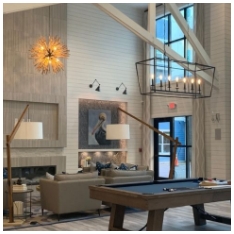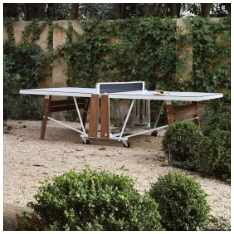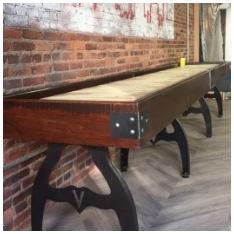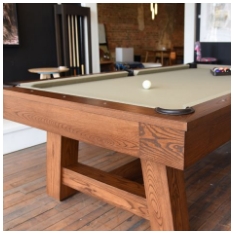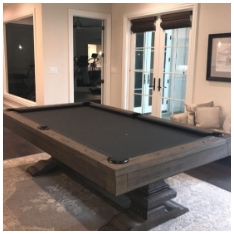Slate is a fine-grained, foliated metamorphic rock that is primarily composed of quartz and muscovite or illite. Its unique properties make it an ideal material for pool tables. Slate is formed under low-grade metamorphic conditions and has a dense, hard structure, making it extremely durable. Its smooth, flat surface is crucial for a consistent and predictable ball roll, which is why it's the preferred choice for high-quality pool tables.
Why Slate is Preferred for Pool Tables
Durability and Longevity
One of the primary reasons slate is used in pool tables is its durability. Unlike wood or other materials, slate does not warp or bend over time, ensuring that the playing surface remains perfectly level. This longevity makes slate pool tables a valuable investment for serious players and commercial establishments.
Smooth and Level Playing Surface
The smoothness of slate is unparalleled, providing a consistent roll for the balls. This smooth surface is essential for precision in the game, allowing players to predict ball movement accurately. Slate can be ground and polished to an extremely flat surface, ensuring the table remains level throughout its lifespan.
Stability
Slate adds significant weight to the pool table, contributing to its overall stability. This weight helps keep the table stationary during play, preventing any movement that could disrupt the game. The stability provided by a slate bed is crucial for maintaining the integrity of the game.

The Manufacturing Process of Slate Pool Tables
Quarrying and Cutting
The process of creating a slate pool table begins with quarrying the slate from the earth. Large blocks of slate are extracted and then cut into slabs of the appropriate size for pool tables. These slabs are typically around 1 inch thick, although variations exist depending on the table's intended use.
Grinding and Polishing
Once the slate slabs are cut to size, they undergo a grinding and polishing process. This process ensures that the slate is perfectly flat and smooth, providing an ideal playing surface. Multiple layers of grinding and polishing are performed to achieve the desired finish.
Assembling the Table
After the slate is prepared, it is transported to the table manufacturer, where it is assembled into the final product. The slate slabs are fitted into the table frame, and the joints between the slabs are filled and smoothed to create a seamless surface. This careful assembly process ensures that the table meets the high standards required for professional play.
Is it Safe to Stand on a Slate Pool Table?
While slate is incredibly durable, standing on a slate pool table is not recommended. The weight of a person can cause stress on the table frame and the slate itself, potentially leading to cracks or breaks. Additionally, the table's legs and support structure may not be designed to withstand such concentrated weight, posing a risk of damage. To ensure the longevity of your pool table and maintain a safe environment, it's best to avoid standing on it.
Safety Concerns with Slate Pool Tables
Is it Safe to Stand on a Slate Pool Table?
The question of whether it is safe to stand on a slate pool table is a common one. Slate is strong, but it is not indestructible. Standing on the table can place uneven pressure on the slate, increasing the risk of cracks or breaks. Additionally, the table's frame and legs may not be designed to support such concentrated weight, posing a risk of structural damage. For these reasons, it's advisable to avoid standing on your pool table to maintain its condition and ensure safety.
Preventing Damage
To prevent damage to your slate pool table, handle it with care and follow recommended maintenance practices. Avoid placing excessive weight on the table and be mindful of its environment. Temperature and humidity changes can affect the slate and the frame, so keep your pool table in a stable, controlled environment.
Professional Maintenance and Repairs
When in doubt, seek professional help for maintaining and repairing your slate pool table. Professionals have the expertise and tools needed to address any issues effectively, ensuring your table remains in excellent condition. Regular professional check-ups can also help identify potential problems early, preventing more significant damage down the line.
Conclusion
Slate pool tables are a significant investment, offering exceptional durability and a superior playing experience. Proper care and maintenance are essential to preserve their quality and ensure safe use. By understanding the composition and benefits of slate, and following the recommended care practices, you can enjoy your pool table for many years to come.

